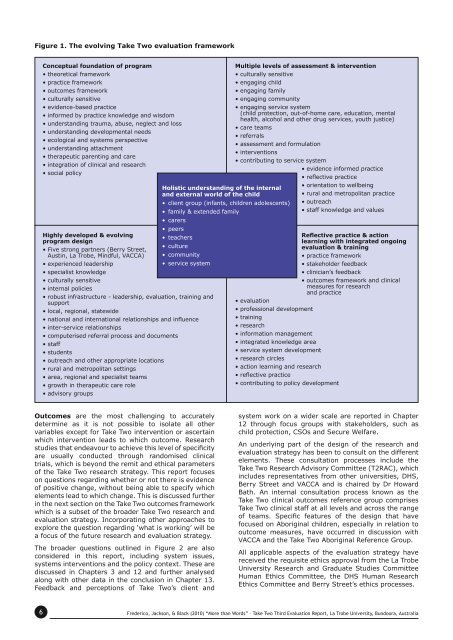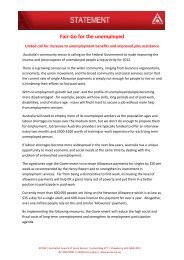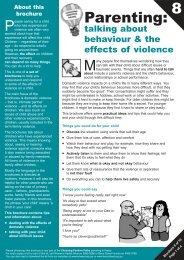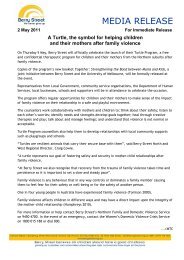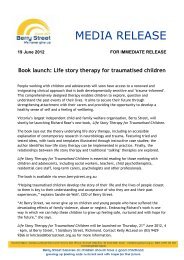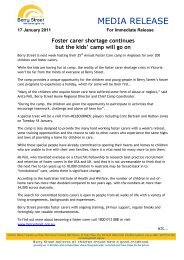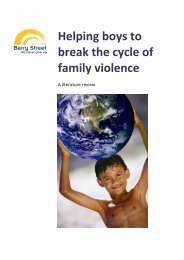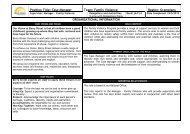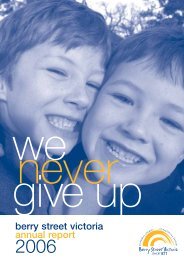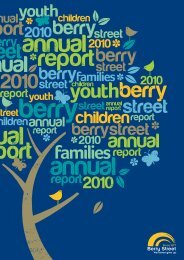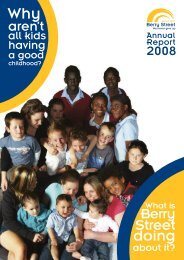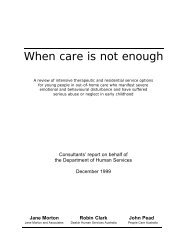Take Two - Third Evaluation Report More than Words ... - Berry Street
Take Two - Third Evaluation Report More than Words ... - Berry Street
Take Two - Third Evaluation Report More than Words ... - Berry Street
Create successful ePaper yourself
Turn your PDF publications into a flip-book with our unique Google optimized e-Paper software.
Figure 1. The evolving <strong>Take</strong> <strong>Two</strong> evaluation framework<br />
Outcomes are the most challenging to accurately<br />
determine as it is not possible to isolate all other<br />
variables except for <strong>Take</strong> <strong>Two</strong> intervention or ascertain<br />
which intervention leads to which outcome. Research<br />
studies that endeavour to achieve this level of speci city<br />
are usually conducted through randomised clinical<br />
trials, which is beyond the remit and ethical parameters<br />
of the <strong>Take</strong> <strong>Two</strong> research strategy. This report focuses<br />
on questions regarding whether or not there is evidence<br />
of positive change, without being able to specify which<br />
elements lead to which change. This is discussed further<br />
in the next section on the <strong>Take</strong> <strong>Two</strong> outcomes framework<br />
which is a subset of the broader <strong>Take</strong> <strong>Two</strong> research and<br />
evaluation strategy. Incorporating other approaches to<br />
explore the question regarding ‘what is working’ will be<br />
a focus of the future research and evaluation strategy.<br />
The broader questions outlined in Figure 2 are also<br />
considered in this report, including system issues,<br />
systems interventions and the policy context. These are<br />
discussed in Chapters 3 and 12 and further analysed<br />
along with other data in the conclusion in Chapter 13.<br />
Feedback and perceptions of <strong>Take</strong> <strong>Two</strong>’s client and<br />
6<br />
Conceptual foundation of program<br />
• theoretical framework<br />
• practice framework<br />
• outcomes framework<br />
• culturally sensitive<br />
• evidence-based practice<br />
• informed by practice knowledge and wisdom<br />
• understanding trauma, abuse, neglect and loss<br />
• understanding developmental needs<br />
• ecological and systems perspective<br />
• understanding attachment<br />
• therapeutic parenting and care<br />
• integration of clinical and research<br />
• social policy<br />
• peers<br />
Highly developed & evolving<br />
• teachers<br />
program design<br />
• culture<br />
• Five strong partners (<strong>Berry</strong> <strong>Street</strong>,<br />
Austin, La Trobe, Mindful, VACCA) • community<br />
• experienced leadership<br />
• service system<br />
• specialist knowledge<br />
• culturally sensitive<br />
• internal policies<br />
• robust infrastructure - leadership, evaluation, training and<br />
support<br />
• local, regional, statewide<br />
• national and international relationships and in uence<br />
• inter-service relationships<br />
• computerised referral process and documents<br />
• staff<br />
• students<br />
• outreach and other appropriate locations<br />
• rural and metropolitan settings<br />
• area, regional and specialist teams<br />
• growth in therapeutic care role<br />
• advisory groups<br />
Holistic understanding of the internal<br />
and external world of the child<br />
• client group (infants, children adolescents)<br />
• family & extended family<br />
• carers<br />
Multiple levels of assessment & intervention<br />
• culturally sensitive<br />
• engaging child<br />
• engaging family<br />
• engaging community<br />
• engaging service system<br />
(child protection, out-of-home care, education, mental<br />
health, alcohol and other drug services, youth justice)<br />
• care teams<br />
• referrals<br />
• assessment and formulation<br />
• interventions<br />
• contributing to service system<br />
• evidence informed practice<br />
• re ective practice<br />
• orientation to wellbeing<br />
• rural and metropolitan practice<br />
• outreach<br />
• staff knowledge and values<br />
Re ective practice & action<br />
learning with integrated ongoing<br />
evaluation & training<br />
• practice framework<br />
• stakeholder feedback<br />
• clinician’s feedback<br />
• outcomes framework and clinical<br />
measures for research<br />
and practice<br />
• evaluation<br />
• professional development<br />
• training<br />
• research<br />
• information management<br />
• integrated knowledge area<br />
• service system development<br />
• research circles<br />
• action learning and research<br />
• re ective practice<br />
• contributing to policy development<br />
system work on a wider scale are reported in Chapter<br />
12 through focus groups with stakeholders, such as<br />
child protection, CSOs and Secure Welfare.<br />
An underlying part of the design of the research and<br />
evaluation strategy has been to consult on the different<br />
elements. These consultation processes include the<br />
<strong>Take</strong> <strong>Two</strong> Research Advisory Committee (T2RAC), which<br />
includes representatives from other universities, DHS,<br />
<strong>Berry</strong> <strong>Street</strong> and VACCA and is chaired by Dr Howard<br />
Bath. An internal consultation process known as the<br />
<strong>Take</strong> <strong>Two</strong> clinical outcomes reference group comprises<br />
<strong>Take</strong> <strong>Two</strong> clinical staff at all levels and across the range<br />
of teams. Speci c features of the design that have<br />
focused on Aboriginal children, especially in relation to<br />
outcome measures, have occurred in discussion with<br />
VACCA and the <strong>Take</strong> <strong>Two</strong> Aboriginal Reference Group.<br />
All applicable aspects of the evaluation strategy have<br />
received the requisite ethics approval from the La Trobe<br />
University Research and Graduate Studies Committee<br />
Human Ethics Committee, the DHS Human Research<br />
Ethics Committee and <strong>Berry</strong> <strong>Street</strong>’s ethics processes.<br />
Frederico, Jackson, & Black (2010) “<strong>More</strong> <strong>than</strong> <strong>Words</strong>” – <strong>Take</strong> <strong>Two</strong> <strong>Third</strong> <strong>Evaluation</strong> <strong>Report</strong>, La Trobe University, Bundoora, Australia


